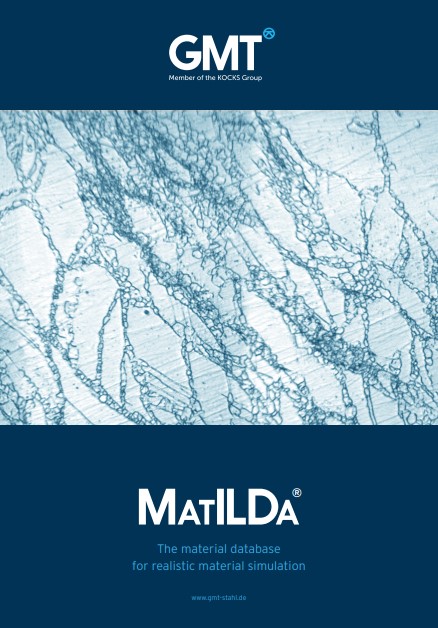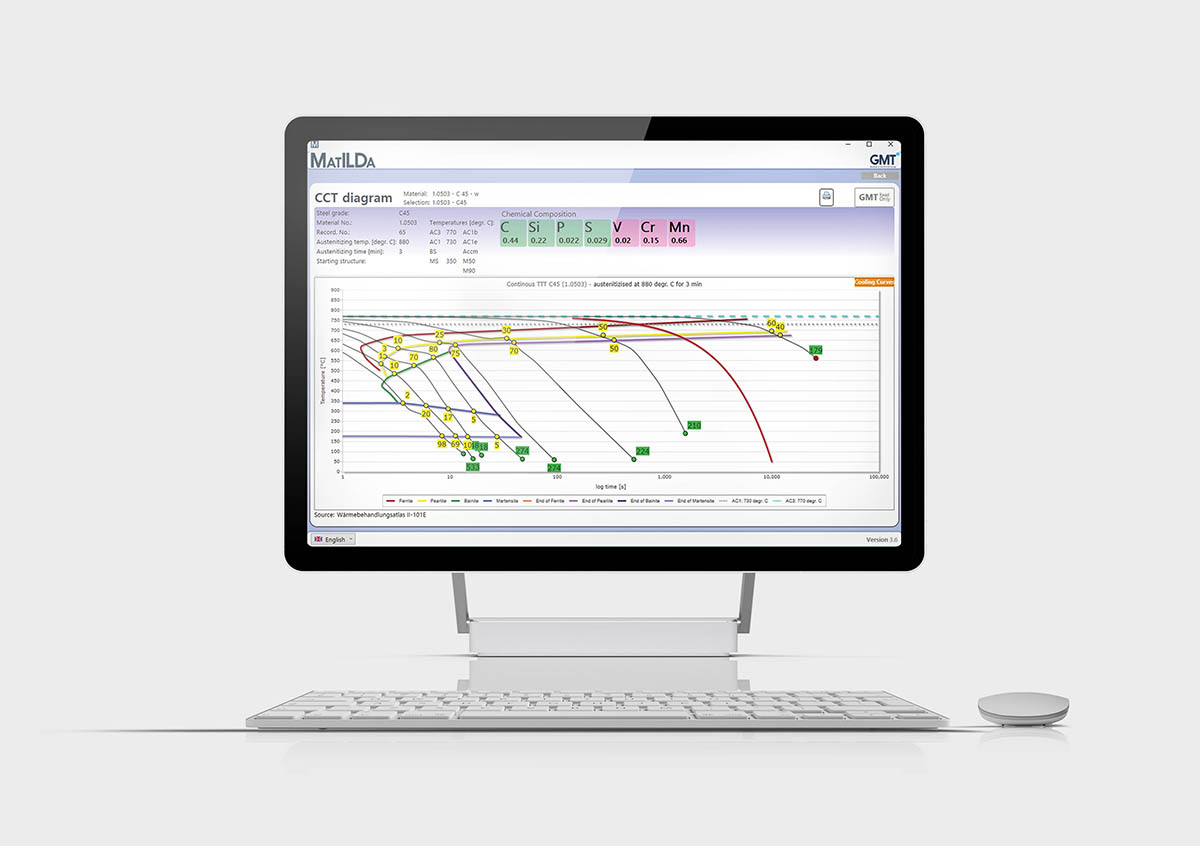The materials database with material data and models based on experiments for realistic FEM simulation
MatILDa® (Material Information Link and Database) is a material database containing experimental data that has been continuously developed by GMT mbH for over twenty years. The data are based on practical material investigations and are therefore highly accurate. The materials database offers an extensive material archive with a wide range of visualization functionalities, for example flow curves and CCT diagrams. This knowledge is also accessible to FEM simulation programs via special interfaces.
00:00
00:00
Precise mapping of processes made possible by realistic material data
The MatILDa® materials database is used for simulating material behavior in forming processes and during heat treatment. The more accurate the data available in a material database, the higher the degree of consistency of the simulation results with reality. In this respect, the MatILDa® materials database offers clear advantages over other databases, as it provides physical and mechanical properties for a wide range of materials and offers realistic calculation options for flow curves, grain sizes and transformation diagrams.
The advantages of the MatILDa® material database:
Precise Data: Reliable and precise material information based on extensive research data and industry standards.
Time Savings: Quick access to and analysis of material information.
Cost Reduction: Minimization of material errors and expensive iteration loops in product development.
Promotion of Innovation: Enables innovative and high-performance designs and products.
MatILDa®: An extensive material database with experimental data, data-driven models, neural networks and customization options to meet your requirements. You can also read our publication on the use of the MatILDa® material database in FEM simulations.
Time Savings: Quick access to and analysis of material information.
Cost Reduction: Minimization of material errors and expensive iteration loops in product development.
Promotion of Innovation: Enables innovative and high-performance designs and products.
MatILDa®: An extensive material database with experimental data, data-driven models, neural networks and customization options to meet your requirements. You can also read our publication on the use of the MatILDa® material database in FEM simulations.
Materials in MatILDa
United in one place: material data and models for alloys of steel, titanium, aluminum, nickel, cobalt, copper and zinc
Flow curves database
Extensive flow curve database for cold and hot forming processes as well as temperature-dependent material properties for steel alloys and non-ferrous metals
Recrystallization model
Calculation of grain sizes during forming processes and heat treatment within a microstructure simulation
Database on CCT diagrams
Calculation of microstructural transformation in steels using diverse CCT diagrams, TTT diagrams or neuronal networks
Interfaces & Functionalities
Convenient data exchange via standard interfaces, e.g. with QForm UK, simufact and AutoForm
Request initial MatILDa® consultation now!
Our experienced team of materials engineers is here to assist you in using MatILDa®. We will help you effectively utilize the database and find the optimal material data and models for your individual projects. Our goal is to provide you with tailor-made solutions and help you conquer your materials challenges.

We would be pleased to provide you with a demo version or a non-binding offer. Please feel free to contact our materials expert.

What the MatILDa® material database offers
MatILDa® is an innovative material database containing an extensive collection of material data for the simulation of material behavior in forming processes and during heat treatment. This material data, the majority of which has been acquired experimentally, can be used in a wide range of simulation programs, FEM programs and individual process software, and enables an accurate modeling of the material behavior within FEM simulation. MatILDa® thus enables a realistic representation of your process. Extensive information can be retrieved for a wide range of steels, non-ferrous metals and special materials:
✔ Temperature-dependent properties such as modulus of elasticity (Young's modulus), thermal expansion, thermal conductivity, specific heat, density, coefficient of linear expansion, thermal diffusivity, and transverse contraction coefficient based on experimental data
✔ Flow curves database with diverse flow curve equations based on experimental data
✔ Models of recrystallization behavior calculating resulting grain sizes
✔ CCT diagrams, forming CCT diagrams, welding CCT diagram, TTT diagrams
✔ Phase transformation models using neuronal networks
✔ Temperature-dependent properties such as modulus of elasticity (Young's modulus), thermal expansion, thermal conductivity, specific heat, density, coefficient of linear expansion, thermal diffusivity, and transverse contraction coefficient based on experimental data
✔ Flow curves database with diverse flow curve equations based on experimental data
✔ Models of recrystallization behavior calculating resulting grain sizes
✔ CCT diagrams, forming CCT diagrams, welding CCT diagram, TTT diagrams
✔ Phase transformation models using neuronal networks
Which materials are available in the MatILDa® database?
Basically, material data and material models are available for metallic alloys: steels, non-ferrous metals and special materials. The MatILDa® materials database contains common low carbon steels as C35 or C45 (AISI 1035 or AISI 1045), case hardening steels like 16MnCr5 (AISI 5115) as well as quenched and tempered steels like 42CrMo4 (AISI 4140) or high alloyed steels like X5CrNi18-10 (AISI 304). You will also find titanium materials such as TiAl6V4 (ASTM grade 5) as well as various nickel-based alloys such as Inconel 600, Inconel 625 and Inconel 718 (alloy 600 / 2.4816, alloy 625 / UNS N06625 and alloy 718 / UNS N07718) or NiMn5 (2.4116) in our database. Material properties are available for common alloys such as AlMg3 (3.3535 / 5754) or CuZn37 (2.0320 / CW508L / CZ108). Further alloys of tin, zinc, cadmium and lead can be provided on request. Just have a look at our materials catalogue!
Details on the functions of our material database
Material data based on experiments and material models collected over decades are available in the MatILDa® materials database for various forming processes and heat treatments.
Temperature-dependent properties
MatILDa® contains numerous thermal-physical characteristic values as a function of temperature, such as thermal expansion, Young's modulus, thermal conductivity, specific heat, density and thermal diffusivity. These are available for alloys of steel, titanium, aluminum, nickel, cobalt, copper and zinc.
Flow Curves Database
The MatILDa® software provides numerous flow curves in tabular and analytical form in an extensive flow curve database. These are hot flow curves and cold flow curves as a function of forming temperature, true strain and strain rate. Further influences on the flow stress are the microstructure, the heat treatment condition of the material, for example as rolled, normalized or soft-annealed, and the stress state for the selected forming process: compression test, torsion test or tensile test. In the MatILDa® materials data base, various approaches according to Hensel/Spittel are used for cold and hot flow curves as well as for the flow stress description from measured value tables. These are available for steel alloys, non-ferrous metals and special materials.
Recrystallization model
The microstructure of metallic materials recrystallizes dynamically during forming when the critical true strain for dynamic recrystallization is exceeded (dynamic recrystallisation. In the time between the forming passes, the material recrystallizes statically in the areas where no dynamic recrystallization has occurred (static recrystallisation). The semi-empirical model describes these grain size changes in the material within the microstructure simulation. For steels and a number of Ni-based alloys, the parameters are available in the database.
CCT database
For phase transformation modeling, experimentally achieved CCT diagrams are available in the CCT database of MatILDa® for a variety of steel grades: CCT diagrams, forming CCT diagrams, isothermal CCT diagrams, welding CCT diagrams and TTT diagrams.
Phase transformation
In addition, it is possible to model the phase transformation on the basis of extensive evaluation of CCT diagrams for various cooling sequences: neuronal networks allow the microstructure fractions and hardness to be determined for a number of steel groups on the basis of the chemical analysis and the austenitizing temperature.
In practice, the evaluation of a forming process or a heat treatment with FEM simulation is only possible precisely with accurate material data and material models
MatILDa®'s main field of application is in the simulation of material behavior (material simulation). The modeling of a forming process or a heat treatment within a FEM simulation can be used for a realistic evaluation. However, the relevant material data and material models must also represent the real material behavior. The agreement between simulation results and reality is maximized when the available material data is accurate and when the experimental parameters match the forming process. The database is a comprehensive and reliable basis for making precise decisions on material behavior and property formation, for example about:
• the influence of chemical analysis on the most important material properties,
• the material properties resulting from forming processes and heat treatments,
• the mechanical and physical properties as a function of temperature, and
• the microstructure (e.g. average grain size, grain size distribution, recrystallized amount, grain growth) and
• the phase transformations (e.g. phase fractions of ferrite, pearlite, martensite or bainite, hardness) during forming and cooling.
• the influence of chemical analysis on the most important material properties,
• the material properties resulting from forming processes and heat treatments,
• the mechanical and physical properties as a function of temperature, and
• the microstructure (e.g. average grain size, grain size distribution, recrystallized amount, grain growth) and
• the phase transformations (e.g. phase fractions of ferrite, pearlite, martensite or bainite, hardness) during forming and cooling.
Why realistic and accurate material data and models in a materials database are so important
Simulation processes support the evaluation of real forming processes and heat treatments in many ways, either in the context of process design, in the identification of defects or in the use of completely new materials. For example, would you like to estimate the loads on the tools with the aid of a materials database with exact data before using a new material? Or do you want to simulate a new temperature control before a test or even instead of a test? Are design adaptations of your machines or tools planned, which should be checked before a costly investment in FEM software? Or do you have defects on your components and want to find out their cause?
Use experimental data from the MatILDa® materials database for realistic FEM simulation results!
Use experimental data from the MatILDa® materials database for realistic FEM simulation results!
FEM simulation with realistic material data for a wide range of applications
The MatILDa® material data base is used by a large number of our customers from various industries, whether to support offline or online process models or as a database for FEM simulation. In principle, the material data can be used in all forming processes and heat treatments.
MatILDa® is a materials database with a high degree of flexibility in export
Data exchange is uncomplicated by using export files or by directly connecting to the simulation software. Standard interfaces exist for material data supply for simufact, QForm UK, AutoForm and KMS, among others. Furthermore, MatILDa® can be used as a stand-alone program. In this way, material data can be managed and supplemented company-specific.
The materials database with interactive interface and numerous visualizations
Using an interactive interface, the data can be visualized and the influences of individual settings of the respective model parameters can be simulated with practical controllers.
Why GMT mbH is your ideal partner for materials data
The proper handling of material data supports the realistic simulation within the scope of a FEM simulation. For more than twenty years the software MatILDa® has been continuously developed at GMT mbH. Thereby the employees of GMT contribute an extensive material and process knowledge and can advise you competently regarding the appropriate use of the material data.
For 20+ years, we have been applying our expert knowledge to the MatILDa® materials database
Therefore, we are the perfect partner for specific queries, consulting and individualization of your software for FEM simulation.
The extensive materials know-how available at GMT is the foundation of the MatILDa® materials data base:
The extensive materials know-how available at GMT is the foundation of the MatILDa® materials data base:
Materials consulting
for the use of new alloys e. g. steel, titanium, aluminum, nickel (Inconel), cobalt, copper, zinc
Recommendation of test settings
e.g. for flow curves, recrystallisation models and CCT diagrams for the appropriate inclusion of new material data and models for special applications
Recording of new material data, plausibility check
We take over the recording of new material data, the plausibility check of the obtained results and the input of the values or correlations into the database
Professional handling of all types of CCT diagrams
This includes CCT diagrams, forming CCT diagrams, welding CCT diagrams isothermal CCT diagrams as well as TTT diagrams
Preparation and development of material calculations and models
We are your ideal partner for selecting the appropriate material data and models and offer support in interpreting simulation results of forming processes and heat treatments
What is the experience of GMT mbH in the field of materials and forming simulation?
The employees of GMT have a sense for materials: Is it easy to form this alloy? Will ferrite, pearlite, bainite or other phase components form with this composition? Or will it melt when heated? What heat treatment concept is suitable for a particular alloy? And would the yield curve of this steel alloy have to show a specific yield strength? Which phases should be represented in the CCT diagram for a specific composition? And which testing concept do I need for the simulation of a closed-die forging process?
More than 20 years of experience in the field of metal processing industry and research
Since its founding, GMT mbH has been working in the exciting intersection of the metal processing industry and research. For this reason, GMT is able to impart and acquire theoretical contexts as well as to competently accompany the application on an industrial scale.
Trainings on all relevant MatILDa® topics
Do you want to extend the handling of material data in your company? Or would you like to use MatILDa® as a database for your material data? We would be pleased to advise you on all aspects of material data as well as material models and their recording, modelling, evaluation and maintenance. Please contact us for further information.


